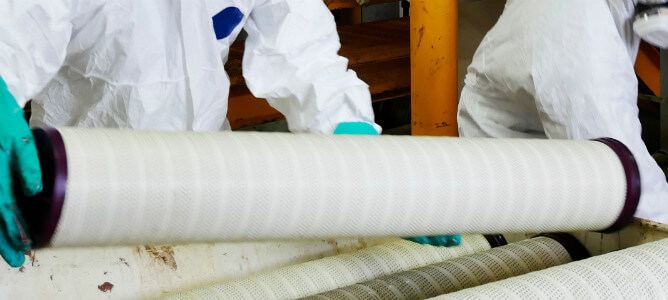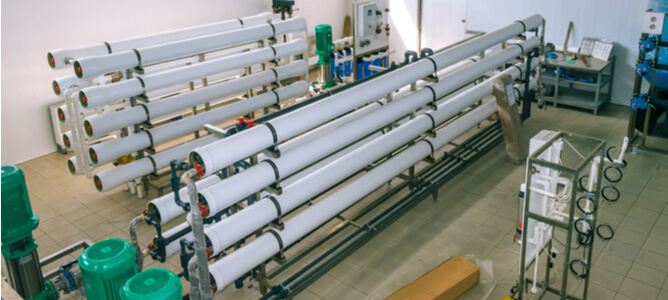
Hollow-Fiber Membrane Technology-Industrial Applications & How It Works
Many industries utilize fluid filtration systems in their manufacturing processes. Fluid, particle, and microbiologic filters are commonly used to eliminate impurities that could damage sensitive equipment or alter the quality of finished components. One of the most effective ways to achieve industrial filtration is by the use of hollow-fiber membranes.
What Is Hollow-Fiber Membrane?
A hollow-fiber membrane is a filtration device that utilizes a physical barrier mechanism to separate impurities from any fluids channeled through it. The main components within the device are hollow tubes with minute pores that permit the entry of water molecules but keep out larger organic or inorganic contaminants (particles, bacteria).
How Does A Hollow-Fiber Membrane Work?
As earlier stated, a hollow-fiber membrane is a collection of hollow tubes that contain micropores, making them selectively permeable to fluids like water. When a stream of contaminated fluid is channeled over the exterior of the tubes, contaminants such as viruses, bacteria, and cysts are retained outside their lumens, while clean fluid will filter through the micropores, thus achieving separation.
Standard versions of hollow-fiber membranes are fitted with pore openings of 0.2 microns, while membranes with pores size as tiny as 0.01 microns are also available. While filtration systems with smaller pore sizes have their benefits, including better viral particle separation, hollow-fiber membranes with larger pores are hydrophilic, allowing easier water entry with less resistance to fluid flow. This characteristic is particularly beneficial in gravity-dependent applications.
What Is a Membrane Module?
A membrane module refers to a collection of filtration tubes banded together within a housing unit. The casing typically features feed inlet, concentrate outlet, and permeate outlets. While the feed inlet supplies the water or fluid to be filtered, the concentrate outlet helps to remove separated impurities while clean water is extracted at the permeate outlet.
The use of a membrane module is vital in industrial separation as it helps operators conduct large-scale filtration operations efficiently and cost-effectively. Membrane modules are typically assembled to maximize space and limit costs of the containing vessel. For example, a standard hollow-fiber membrane module with 100mm diameter fibers will house up to 600 m2 of filtration membrane area.
Applications of Hollow-Fiber Membrane
Hollow-fiber membrane filters are currently being employed in a diverse range of industrial process cutting.
Key applications utilizing this fluid separation technique include:
- Treatment and purification for surface and groundwater
- Oil and gas processing (residual oil removal)
- Oil and gas processing (sulfate removal)
- Kidney dialysis
- Biopharmaceutics
Treatment and Purification for Surface and Groundwater
Hollow-fiber membranes can be used to effectively treat contaminated surface water or groundwater. This filtration method will achieve rapid water purification without unnecessary wastages or mineral losses. There is also no need for holding tanks associated with other water filtrations methods allowing operators to save precious industrial floor space.
Oil and Gas Processing: Residual Oil Removal
There are numerous oil and gas processes where hollow-fiber membranes are utilized, including residual oil removal. Industrial wastewater generated as a by-product of oil and gas recovery typically contains high levels of oil residue, which makes it unsuitable for discharge into water bodies. Further, Ultrafiltration with hollow-fiber membranes will allow operators to meet discharge criteria fixed by local/national environmental regulatory agencies.
Oil and Gas Processing: Sulphate Removal
A significant challenge faced by players in the oil and gas industry is how to eliminate sulfur from their processes. Hollow-fiber membranes can be optimized to eliminate sulfur responsible for well souring in enhanced oil recovery.
Kidney Dialysis
Hollow-fiber membrane tech has found usefulness in the medical treatment of persons with kidney diseases. Dialysis machines fitted with hollow-fiber membranes can eliminate harmful substances from the body by physically separating the constituents of blood based on molecule sizes.
Blood channeled through the lumen of the dialyzer’s fibers is surrounded by a dialysate fluid within the casing of the module. Toxins and unwanted chemicals will diffuse into the dialysate while blood is returned to the patient’s circulation.
Biopharmaceutics
Antibiotic manufacturing, enzyme synthesis, blood product separation, and toxin/pyrogen filtration represent biopharmaceutical applications for hollow-fiber membranes. Medical service providers are increasingly using filtration technology to treat a diverse range of medical conditions. Biopharmaceutical membrane filters can perform ultra, micro, and nanofiltration processes.

Advantages and Disadvantages of Membrane Separation
Utilizing hollow-fiber membrane modules have their benefits and drawbacks. These pros and cons are outlined below.
Advantages
- Effective removal of microbiological contaminants (bacteria, fungi, viruses)
- Non-chemical separation with no risk of alteration to the composition of filtered fluids
- An energy-efficient process requiring zero electrical energy
- Cost-effective filtration system
- Zero waste generation
- No need for storage/housing tanks saving industrial floor space
Disadvantages
- Vital fluid components might be lost/retained if inappropriate membrane fiber pores sizes are used
- The formation of air bubbles on membrane fibers will diminish absorption and overall efficiency
- Typically, more expensive than other filtration techniques
NiGen Offers Dependable Nitrogen Membrane Filtration for Industrial Use
At NiGen International, we offer smart technological solutions to our partners in various manufacturing industries. For industrial players seeking to optimize their industrial filtration processes, NiGen is the best fit.
Contact us online today to learn more about our high-quality nitrogen membrane filtration systems.

